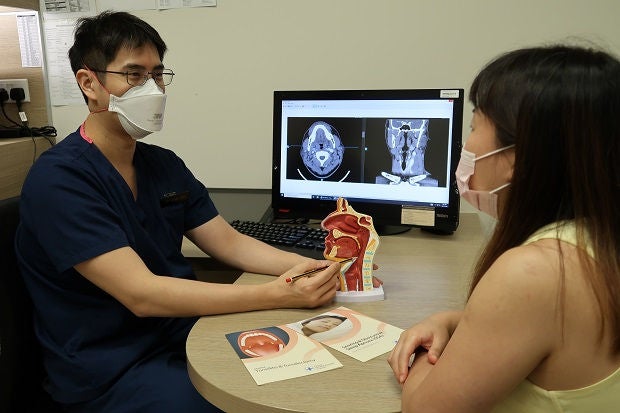
From treating tonsillitis to sleep disorders, it’s all in a day’s work for Dr John Loh.
One of the most basic
surgical skills that ear,
nose and throat (ENT)
specialists are trained
to perform is a tonsillectomy, or
the removal of the tonsils.
At Changi General Hospital (CGH), Dr John Loh and other ENT surgeons go through about 100 cases of adult tonsillectomies every year, making up about a third of the nation’s total cases.

“A viral or bacterial infection may cause the tonsils to get inflamed, which is a condition known as tonsillitis. When patients have chronic or recurrent tonsillitis, a tonsillectomy is recommended,” said Dr Loh, Associate Consultant, Department of Otorhinolaryngology – Head and Neck Surgery, CGH.
Tonsils are a pair of ovalshaped pads found at the back of the throat and are part of the body’s defence system to prevent infections. A patient with tonsillitis may experience severe sore throat, high fever, or enlarged lymph nodes that feel like lumps along the neck.
Although tonsillitis is a common condition, Dr Loh cautions against taking it lightly.
“Sometimes, the inflammation can be serious enough to cause airway obstruction or form abscesses. We look out for danger signs like difficulty in swallowing, poor food and fluid intake, dehydration, and difficult or noisy breathing,” said Dr Loh.
He is also wary of asymmetrical enlargement of one tonsil, a non-healing ulcer, or enlarged neck lymph nodes, which could be signs of tonsil cancer.
Apart from tonsillitis, Dr Loh manages a diverse range of conditions affecting the head and neck region, such as allergic rhinitis, and cancers of the thyroid, head and neck.
“I find the head and neck region fascinating because of the complex anatomy and close proximity to many sensory organs. I also have a particular interest in sleep medicine and surgery, as the effects of sleep disorders are far-reaching.”
In the course of his work, he has seen how sleep disorders, such as snoring, upper airway resistance syndrome and obstructive sleep apnoea (OSA), not only affect the quality of a person’s sleep, but also cause tiredness and fatigue during daytime, and in some cases even lead to higher risk of heart disease and stroke.
Most people sleep for a third of their life, and yet sleep disorders tend to be under-diagnosed.
An especially challenging and as patients usually have several co-existing medical problems requiring the help of a multidisciplinary team. Dr Loh works with specialists from the respiratory, psychiatry, psychology and neurology departments to ensure that the care plan is individualised, while taking into consideration the patient’s anatomy and lifestyle needs.
“This way, we can achieve optimised outcomes for the patient,” said Dr Loh.
He once had a patient who was barely getting an hour of quality sleep every night due to OSA. A home sleep study revealed that complex condition to treat is OSA, he experienced severe drops in oxygen levels caused by frequent and repeated pauses in breathing during sleep. While the levels generally returned to normal once regular breathing restarted, Dr Loh knew frequent breathing gaps can pose serious health concerns. He then started the patient on continuous positive airway pressure (CPAP) treatment.
“After the treatment, the patient felt energised with eight hours of quality sleep, compared to previously where he felt lethargic even with more than 10 hours of sleep,” said Dr Loh.
Read more: Got sleep apnea? Here are quick tips for mild, moderate and severe.
It is moments like these that give Dr Loh a sense of satisfaction, knowing that he has helped improve and resolve patients’ problems.
On working days, Dr Loh is in the hospital by 8am to do his ward rounds, during which he follows up on patients who have been admitted for ENT conditions. Once a week, he is in the operating theatre to perform ENT-related surgeries.
Other than clinical duties, he teaches medical students from the National University of Singapore’s Yong Loo Lin School of Medicine and Nanyang Technological University’s Lee Kong Chian School of Medicine. He also mentors junior doctors.
“As a beneficiary of countless hours of mentorship, I feel it is now my responsibility to guide the next generation of doctors and students along their journey,” he said.
To unwind, Dr Loh enjoys regular exercise and an occasional glass of wine. While not quite an adrenaline junkie, he used to look forward to regular diving and snowboarding trips overseas before the COVID-19 pandemic.
These days, he has found a different outlet in the form of monthly jamming sessions with a hobby band called ‘Haphazards’, with whom he plays the drums.
Get the latest updates about Singapore Health in your mailbox! Click here to subscribe.













 Get it on Google Play
Get it on Google Play